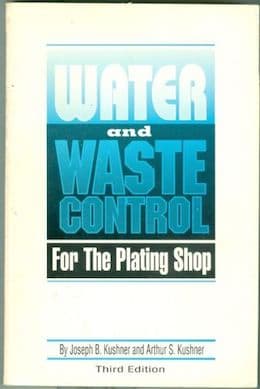
-----
WATER RESISTIVITY FOR DI RINSE?
Please HELP! What is water resistivity for DI cold rinse tanks and Hot DI rinse tank (in kilohm or Megaohm) in the process of copper, silver and nickel plating solution.
This is message for Ted Mooney. I have read your paper in Metal Finishing Guidebook about water rinsing but it didn't mention anything about what water resistivity should be for rinse DI water.
Thanks,
Hana T. [last name deleted for privacy by Editor]- San Carlos, California, USA
2003
2003
Hello Hana.
Many people feel that all plating rinses (indeed, all water used in a plating shop) should be deionized. Still, most existing plating rinses are not de-ionized at all, so it's very hard to give you a hard number; no matter what we say, another plater can log on and say s/he's been successfully using city water with a conductivity ten times higher than that for years :-)
Probably 50,000 ohms is good if you just need a number (of course there are critical operations where this wouldn't be good enough), but I'd probably approach it a bit differently. The resistance of the water coming out of the deionizer is going to follow an asymptotic curve anyway. It's going to be good for a long while, and then rather rapidly decline towards a limiting value (the resistance of the city water). So what I would probably do is graph the resistance vs. the gallons of water that has been deionized, examine the curve, and say that it probably doesn't make sense to bother going beyond point X because the decline is so rapid anyway.
by Kushner & Kushner

on eBay (rarely)
or Amazon (rarely)
(affil link)
We have an outstanding article by Bob Utech on line here at www.finishing.com/library/utech/cleanforpowder.html, which talks about deionizers and water quality. You may also want to borrow or buy Kushner's "Water and Waste Control for the Plating Shop" ⇦[this on
eBay,
Amazon,
AbeBooks affil links].
Good luck.

Ted Mooney, P.E.
Striving to live Aloha
finishing.com - Pine Beach, New Jersey
Ted is available for instant help
or longer-term assistance.
2003
It would be nice if there were some simple, universal guidelines for rinsing in terms of conductivity or resistivity, but there aren't any. The resistivity of the water sent to the rinse tank is far less important than the resistivity of the water that is on the parts when they leave the rinse tank. This is the reason that in many critical applications, the final rinse is a spray with DI water, rather than an immersion rinse. For example, you could send 1 Meg-Ohm-cm water to an immersion rinse tank, but, depending upon the flow rate, the resistivity in the tank could be much lower than 50,000 Ohm-cm.
Unless it is a final rinse, and you are trying to get a spot-free rinse or a surface that is free of ionic contamination, the resistivity may be less important than the ions present. For example, it would do no harm to drag low concentrations of sulphates and chlorides into a Watts nickel bath, but it could cause problems if you drag chlorides into a silver plating bath.
Lyle Kirmanconsultant - Cleveland Heights, Ohio
2003
Dear expert,
Is it true DI @ 25 °C with a max theoretical resistivity of 18M.ohm.cm ? (would you brief the theory ? About equilibrium of H+/0H- ions at certain temperature ? )What possible condition could exceed the value that 18.5M.ohm.cm was actually measured ?
Ultra pure DI is aggressive, even after dissolved with CO2 bring down resistivity to ~1M.ohm.cm, that spray on Aluminium deposited Si surface for few minutes can have metal slightly dissolved, this is logical. But what about some holes that how to explain if found on Al surface after spray at RT ?
Regards,
Terence Wongsemi-conductor assembly - Hong Kong, China
Q, A, or Comment on THIS thread -or- Start a NEW Thread